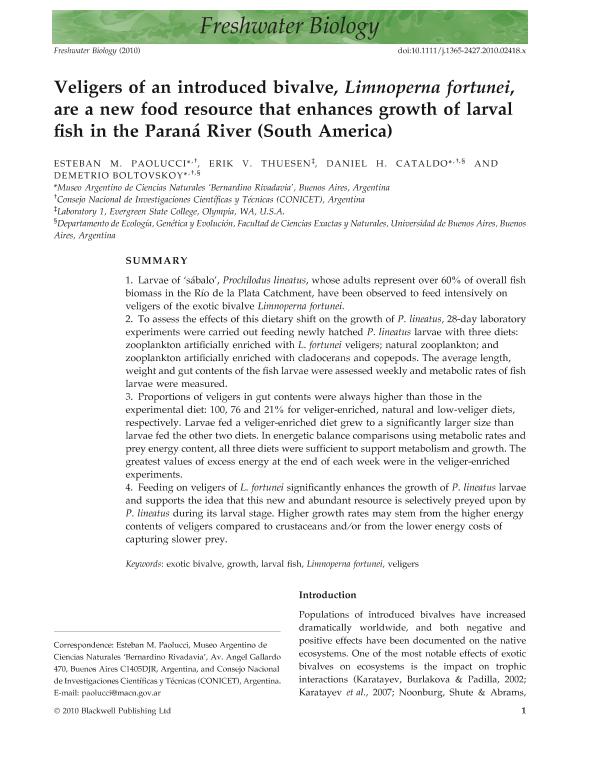Artículo
Veligers of an introduced bivalve, Limnoperna fortunei, are a new food resource that enhances growth of larval fish in the Paraná River (South America)
Fecha de publicación:
09/2010
Editorial:
Wiley Blackwell Publishing, Inc
Revista:
Freshwater Biology (print)
ISSN:
0046-5070
Idioma:
Inglés
Tipo de recurso:
Artículo publicado
Clasificación temática:
Resumen
1. Larvae of 'sábalo', Prochilodus lineatus, whose adults represent over 60% of overall fish biomass in the Río de la Plata Catchment, have been observed to feed intensively on veligers of the exotic bivalve Limnoperna fortunei.2. To assess the effects of this dietary shift on the growth of P. lineatus, 28-day laboratory experiments were carried out feeding newly hatched P. lineatus larvae with three diets: zooplankton artificially enriched with L. fortunei veligers; natural zooplankton; and zooplankton artificially enriched with cladocerans and copepods. The average length, weight and gut contents of the fish larvae were assessed weekly and metabolic rates of fish larvae were measured.3. Proportions of veligers in gut contents were always higher than those in the experimental diet: 100, 76 and 21% for veliger-enriched, natural and low-veliger diets, respectively. Larvae fed a veliger-enriched diet grew to a significantly larger size than larvae fed the other two diets. In energetic balance comparisons using metabolic rates and prey energy content, all three diets were sufficient to support metabolism and growth. The greatest values of excess energy at the end of each week were in the veliger-enriched experiments.4. Feeding on veligers of L. fortunei significantly enhances the growth of P. lineatus larvae and supports the idea that this new and abundant resource is selectively preyed upon by P. lineatus during its larval stage. Higher growth rates may stem from the higher energy contents of veligers compared to crustaceans and/or from the lower energy costs of capturing slower prey.
Palabras clave:
Exotic Bivalve
,
Growth
,
Larval Fish
,
Limnoperna Fortunei
,
Veligers
Archivos asociados
Licencia
Identificadores
Colecciones
Articulos(IEGEBA)
Articulos de INSTITUTO DE ECOLOGIA, GENETICA Y EVOLUCION DE BS. AS
Articulos de INSTITUTO DE ECOLOGIA, GENETICA Y EVOLUCION DE BS. AS
Articulos(MACNBR)
Articulos de MUSEO ARG.DE CS.NAT "BERNARDINO RIVADAVIA"
Articulos de MUSEO ARG.DE CS.NAT "BERNARDINO RIVADAVIA"
Citación
Paolucci, Esteban Marcelo; Thuesen, Erik V; Cataldo, Daniel Hugo; Boltovskoy, Demetrio; Veligers of an introduced bivalve, Limnoperna fortunei, are a new food resource that enhances growth of larval fish in the Paraná River (South America); Wiley Blackwell Publishing, Inc; Freshwater Biology (print); 55; 9; 9-2010; 1831-1844
Compartir
Altmétricas




